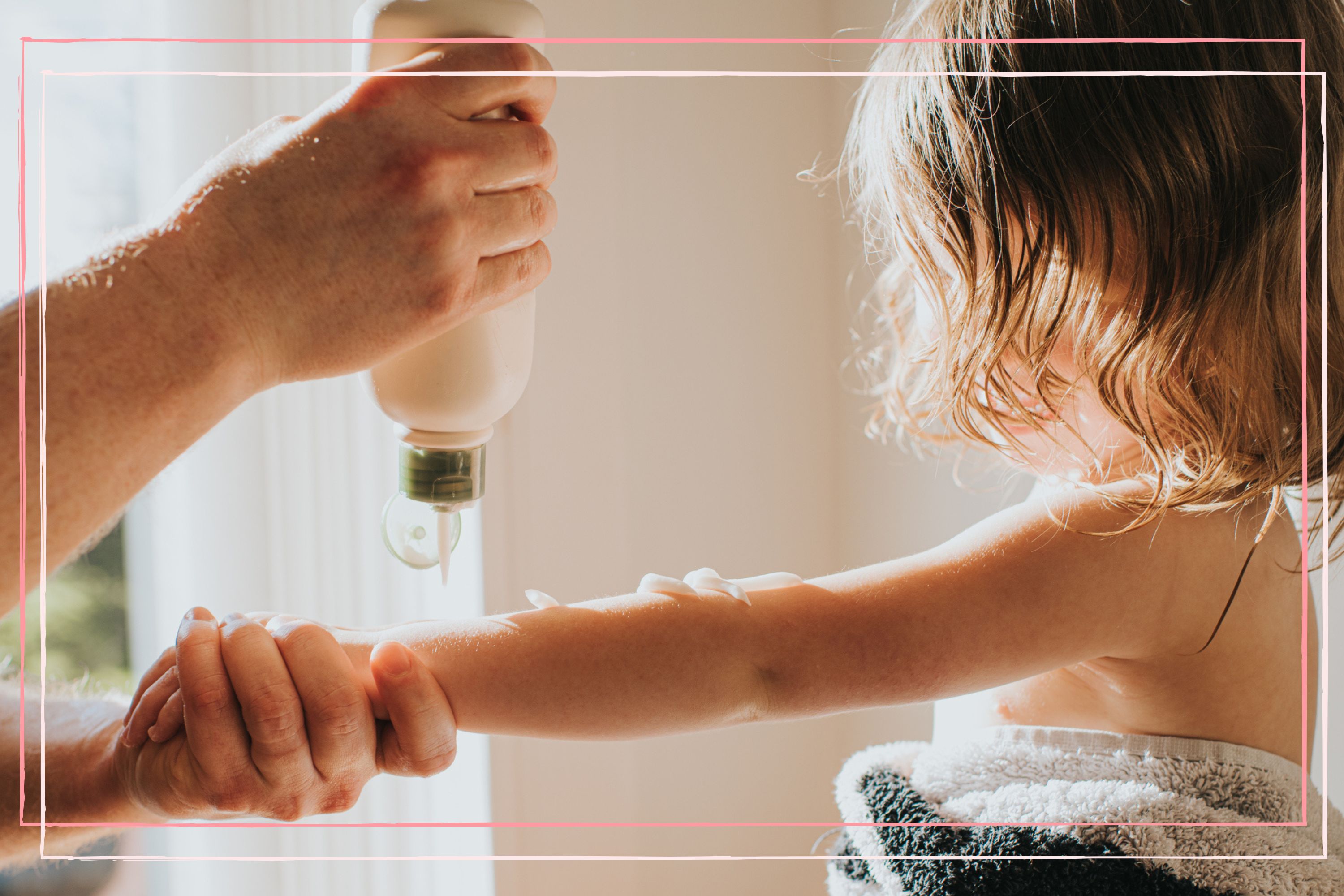Advice on psoriasis in children from dermatologists, including how to manage symptoms at home
Dermatologists answer some common questions about psoriasis in children and provide advice on how parents can help their child manage the skin condition


Psoriasis in children is rare, but there are plenty of effective treatments that can help control the symptoms, and things parents can do at home to help their child achieve long-term remission or manage flare-ups.
Psoriasis is common in the UK, with around one in 50 people suffering from the chronic (long lasting) skin condition. However, the skin condition is much rarer in children, with the prevalence of psoriasis in kids estimated to be around 0.71% in the UK.
The exact cause of psoriasis is not fully understood and getting a psoriasis diagnosis for your child might be confusing or even upsetting. For expert insight on this topic and to provide some advice and support for parents who may have a psoriasis diagnosis for their child, we spoke to consultant dermatologists Dr Karishma Hemmady and Dr Maham Khan, as well as specialist paediatric dermatologist Dr Teresa Wright. The dermatologists answer some of the most common questions about psoriasis below, and provide their advice on how parents can help their child manage the skin condition at home.
“While there is currently no cure for psoriasis, it is possible to effectively manage the condition in children with appropriate treatment and lifestyle modifications,” says consultant dermatologist Dr Hemmady. "The goal is to control symptoms and improve quality of life for children."
The information in this article is for general purposes only and does not take the place of medical advice. It is essential to be guided by your GP or a dermatologist, who will devise a treatment plan that is specifically suited to your child’s condition. Additionally, take note of official NHS advice - such as these guidelines compiled by Great Ormond Street Hospital - and seek medical advice immediately if the symptoms worsen, new ones appear, an infection develops or if your child becomes particularly distressed.
What is psoriasis in children?
"Psoriasis in children - also known as infantile or paediatric psoriasis - is a relatively rare condition," explains Dr Hemmady. "It is a chronic autoimmune condition characterised by the rapid build-up of skin cells, leading to the formation of scales and red patches on the skin."
Symptoms can vary. "However, they typically include red patches of skin that may be covered with silvery scales anywhere on the body - including the scalp, face, elbows, knees and nappy area," notes Dr Hemmady. "This can simultaneously cause itching and discomfort, leading to irritability."
Parenting advice, hot topics, best buys and family finance tips delivered straight to your inbox.
There are some key things to be aware of when it comes to children’s psoriasis compared to that in adults. "While the basic features of are similar in both children and adults, the presentation and severity may vary," points out Dr Khan. "In children, it often appears as smaller, thinner plaques compared to adults."
Another difference is that symptoms of psoriasis in children are often mistaken for other common skin conditions, such as eczema or nappy rash. "This can lead to misdiagnosis or delayed diagnosis," warns Dr Hemmady. Which is why it is important to consult with an expert in the first place, or make another appointment if skin doesn’t appear to be improving.
When a child is diagnosed, a doctor then has several lines of action. "They may prescribe topical corticosteroids, calcineurin inhibitors or other topical medications to help reduce inflammation," explains Dr Hemmady. "The regular use of moisturisers to help soothe dry, irritated skin and reduce itching, is also something they could recommend." In severe cases, systemic medications or phototherapy may be considered under the supervision of a paediatric dermatologist.
"If a particular treatment is not working within a few weeks of consistent use, your child should be re-evaluated," insists Dr Wright. "This should also be the case if they develop new symptoms - such as joint pain or swelling, as well as any eye discomfort."
What triggers psoriasis in children?
Possible triggers of psoriasis can include a combination of genetic and environmental factors, although the exact cause of psoriasis is not fully understood. Many triggers, unfortunately, can occur in regular aspects of daily life.
"Common triggers for psoriasis in children include stress, skin injuries, infections and certain medications," says Dr Khan.
"Injuries to the skin, such as cuts, scrapes, sunburns or friction from tight clothing may be behind flare-ups," notes Dr Hemmady. "Emotional stress or trauma can also exacerbate symptoms."
"Cold, dry weather can worsen it, while allergic reactions or sensitivities to certain foods or chemicals could also be to blame," Dr Hemmady adds.
Doctors will likely advise avoiding triggers where possible to minimise flare-ups, such as, "skin trauma, certain medications or stress - the latter of which can be managed through mindfulness practices and counselling," says Dr Hemmady. They will also usually recommend using sunscreen and wearing protective clothing when spending time outdoors. "While moderate sun exposure can benefit some individuals with psoriasis, in excessive amounts it can worsen symptoms and increase the risk of skin damage," she adds.
How parents can help their child manage the skin condition at home
Living with a skin condition can be challenging for children, and therefore it’s important to provide them with emotional support and seek personalised medical advice for your child, working with a GP or a specialist to ensure they are following the best possible treatment plan for their condition.
"As a dermatologist, I often advise parents to help manage their child's psoriasis by keeping their skin well-moisturised, avoiding harsh soaps and detergents, minimising stress, and maintaining a healthy lifestyle," says Dr Khan. "It is crucial to maintain a consistent skincare routine and avoid triggers."
"It’s important for you - and your children - to avoid picking or scratching at psoriatic lesions, as this can worsen inflammation and increase the risk of infection," warns Dr Khan.
To help stop your child scratching at the psoriatic lesions, Dr Hemmady suggests keeping your child’s nails short. "This will minimise skin damage from scratching," she explains. To help manage the itching feeling, Dr Hemmady suggests using a cold compress and anti-itch medications, as recommended by a doctor, on the skin.
Dr Hemmady also advises that children with psoriasis shouldn’t be dressed in tight clothing. "Opt for loose-fitting, breathable clothing made from soft fabrics - such as cotton - to minimise irritation," she suggests. "Also, while warm baths or showers can help soothe symptoms, hot water can strip the skin of its natural oils and exacerbate dryness and irritation."
Finally, a generally healthy lifestyle can make the world of difference. "Encourage your child to do regular exercise, drink plenty of water, eat a balanced diet - rich in fruits, vegetables and whole grains - and get adequate sleep," advises Dr Hemmady.
Answers to frequently asked questions about psoriasis in children
Is psoriasis contagious?
No. "Psoriasis is not contagious in the same way that infections like the common cold or flu are, and cannot be transmitted from person to person," insists Dr Hemmady.
"However, genetics can increase the likelihood of multiple family members developing the condition - if one or both parents has psoriasis, their children are more likely to inherit a predisposition," she adds. "Additionally, shared environmental triggers may also be experienced by several siblings being raised together."
Can you get rid of psoriasis in kids?
"While psoriasis cannot be fully cured, it is often effectively managed with appropriate treatment," points out Dr Khan. However, the severity of symptoms - which varies child to child - may impact the timescale of recovery.
"The goal of treatment is to control symptoms and prevent flare-ups," she adds. "It's important to follow up with a doctor if your child's condition does not seem to be improving, despite treatment, or if new symptoms develop."
Can a child with psoriasis go swimming?
Yes, a child with psoriasis can go swimming. "Swimming is generally safe for children with psoriasis, but it's important to rinse off chlorine or salt water afterwards and moisturise the skin to prevent dryness," says Dr Khan.
Dr Hemmady adds that, "if swimming outdoors, use sunscreen to protect from sun exposure." She also suggests keeping an eye on your child’s skin to see whether taking a dip seems to be exacerbating their psoriasis symptoms.
Can a child with psoriasis go to school?
Yes, a child with psoriasis can go to school, provided they feel well enough to. "Children with psoriasis can typically attend school as usual, since the condition is not contagious," states Dr Khan. This is as long as your child's symptoms aren’t leaving them in severe discomfort, which could make learning a struggle - in which case you should seek advice from your child’s doctor.
However, Dr Hemmady adds that parents and teachers may need to take steps to manage the condition in the classroom or on the playground. "This includes coordinating with staff if medication needs to be taken, using sun protection on breaks and providing emotional support," she explains.
How often should I bathe my child with psoriasis?
"Children with psoriasis can bathe as often as they need or want to," says Dr Wright. "In general, baths or showers should be relatively short - at fewer than 10 minutes - and you should use a mild, fragrance-free cleanser." The temperature should be lukewarm to avoid exacerbating dryness and irritation.
Dr Wright continues, "After bathing, you should pat the skin dry with a soft towel, apply any prescription medications to the areas of rash, and then layer on a thick - preferably cream or ointment - fragrance-free moisturiser to all of the skin."
What is the difference between psoriasis and eczema?
"Psoriasis and eczema are both chronic skin conditions, but they have different underlying causes and manifestations," explains Dr Khan. While psoriasis can develop at any age, it typically starts in adulthood, whereas eczema often begins in infancy or childhood.
"Psoriasis is an autoimmune condition characterised by the rapid turnover of skin cells, resulting in the formation of thick, scaly patches," continues Dr Khan. "Eczema, on the other hand, is typically associated with inflammation and results in red, itchy and sometimes oozing patches on the skin." While both conditions can be exacerbated by certain triggers and share some overlapping symptoms, they are distinct entities with different treatment approaches.
Are there foods my child should avoid if they have psoriasis?
"While diet may play a role in managing psoriasis, its impact varies from person to person - some individuals find that certain foods can trigger flare-ups, such as processed, sugary items," says Dr Khan. "Encouraging a balanced diet rich in fruits, vegetables, lean proteins and whole grains may help support overall skin health." However, specific dietary restrictions should be discussed with a healthcare professional.
What’s more, good nutrition and hydration is also important - alongside exercise, sleep and stress management - for maintaining a healthy weight. "There is a strong association between psoriasis and obesity, as well as an increased lifetime risk of high blood pressure, high cholesterol and diabetes in children with psoriasis," warns Dr Wright.
GoodtoKnow consults a range of medical experts to create and fact-check content. Please note, this is general information only - for more personalised medical advice, always speak to your GP or seek urgent medical attention if needed.
OUR EXPERTS

Dr Karishma Hemmady is a consultant dermatologist, who sees patients at East and North Hertfordshire NHS Trust and also in private practice at Stratum Clinics and The Harley Street Dermatology Clinic. Her scope of practice includes paediatric dermatology, as well as inflammatory skin conditions, autoimmune rashes, moles, lumps and bumps, as well as aesthetic dermatology procedures.

Dr Maham Khan is a consultant dermatologist at the Cadogan Clinic in London, with a special interest in inflammatory skin conditions, acne and skin cancer. She trained at Imperial College Healthcare NHS Trust and received a master’s degree in clinical dermatology from the St John's Institute of Dermatology.

Dr Teresa Wright is a paediatric dermatologist with expertise in the diagnosis and management of various dermatological conditions in children - including a particular focus on hemangiomas, vascular lesions, pigmented lesions and paediatric melanoma. She currently serves as chief of paediatric dermatology at Le Bonheur Children's Hospital in Memphis, Tennessee and is a member of the BabyCenter Medical Advisory Board.

Lauren is a freelance writer and editor, with more than eight years of experience working in digital and print journalism. She has penned news and features for titles including Women's Health, Daily Telegraph, Cosmopolitan, The Times, Stylist, The Guardian, Woman & Home, Dazed, The Sun's Fabulous, Yahoo UK and Grazia.
Lauren specialises in covering health and wellness topics—ranging from nutrition and fitness, to health conditions and mental wellbeing. She also runs a weekly newsletter called Well, Actually..., which has been named a Substack Featured Publication.